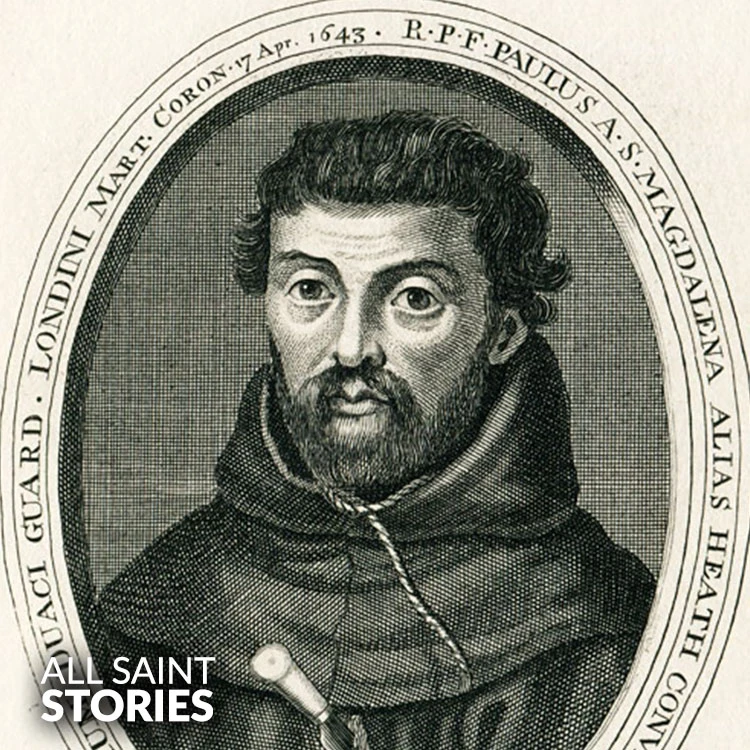"Saint Henry, faithful servant of God, pray for us. Guide us in our daily lives with your wisdom and humility. Help us to lead with justice, compassion, and devotion, just as you did during your reign. Intercede for us before God, that we may grow in holiness and remain steadfast in our faith. Amen."
ST. HENRY HEATH
ST. HENRY HEATH

St. Henry Heath was an English Franciscan priest and martyr, executed for his Catholic faith under anti-Catholic laws in 17th-century England.
St. Henry Heath was born on December 16, 1599, in Peterborough, England, into a Protestant family. Educated at Corpus Christi College, Cambridge, he excelled in his studies and initially pursued an academic life. However, during his time at university, he began to explore the teachings of the Catholic Church and eventually converted to Catholicism — a dangerous and illegal act in Protestant England at the time.
After his conversion, Heath adopted the name Paul of St. Magdalene and traveled to Douai, France, where he joined the English College to study for the priesthood. He later entered the Franciscan Order at Douai, embracing the humble and austere life of the Friars Minor. After his ordination, he volunteered to return to England to minister secretly to persecuted Catholics, fully aware that doing so could lead to his death.
In 1643, just days after arriving back in England, Fr. Henry was arrested while attempting to travel on foot to London. He was discovered carrying items identifying him as a Catholic priest, and under the penal laws of the time, this was considered treason. He was imprisoned, tried, and condemned to death.
On April 1, 1643, Henry Heath was executed at Tyburn by hanging, drawing, and quartering — the standard method of execution for Catholic priests. He met his death with profound serenity, offering his life for the glory of God and the conversion of England.
St. Henry Heath was canonized by Pope Paul VI in 1970 as one of the Forty Martyrs of England and Wales, a group of men and women who gave their lives during the Reformation and were formally recognized for their unwavering fidelity to the Catholic faith.
Video Not Found
No images uploaded for this saint yet.
The information on this website is compiled from various trusted sources. While we aim for accuracy, some details may be incomplete or contain discrepancies.
If you notice any errors or have additional information about this saint, please use the form on the left to share your suggestions. Your input helps us improve and maintain reliable content for everyone.
All submissions are reviewed carefully, and your personal details will remain confidential. Thank you for contributing to the accuracy and value of this resource.
Credits & Acknowledgments
- Anudina Visudhar (Malayalam) – Life of Saints for Everyday
by Msgr. Thomas Moothedan, M.A., D.D. - Saint Companions for Each Day
by A. J. M. Mausolfe & J. K. Mausolfe - US Catholic (Faith in Real Life) – Informational articles
- Wikipedia – General reference content and images
- Anastpaul.com – Saint images and reflections
- Pravachaka Sabdam (Malayalam) – Saint-related content and insights
We sincerely thank these authors and platforms for their valuable contributions. If we have unintentionally missed any attribution, please notify us, and we will make the correction promptly.
If you have any suggestion about ST. HENRY HEATH
Your suggestion will help improve the information about this saint. Your details will not be disclosed anywhere.
© 2026 Copyright @ www.allsaintstories.com


 English
English
 Italian
Italian
 French
French
 Spanish
Spanish
 Malayalam
Malayalam
 Russian
Russian
 Korean
Korean
 Sinhala
Sinhala
 Japanese
Japanese
 Arabic
Arabic
 Portuguese
Portuguese
 Bantu
Bantu
 Greek
Greek
 German
German
 Dutch
Dutch
 Filipino
Filipino